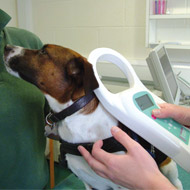
Amended regulations will make microchipping the sole method of ID
Dog licensing requirements are set to change in Northern Ireland, meaning that from January 1, 2015 microchipping will be the sole method of identification in dogs, and the coloured licence tags issued by Councils will be discontinued.
The announcement was made yesterday (Tuesday, 16 December) by Northern Ireland's agriculture minister, Michelle O'Neill.
Minister O’Neill said: "Microchipping of your dog is a compulsory part of dog licensing and following consultation with council chief executives, it was agreed to discontinue with the coloured tag, issued with a dog licence or upon licence renewal.
"Dog owners must still ensure that their name and address is inscribed on the dog’s collar or on a plate or badge attached to it. This requirement remains in place."
As part of the new regulations, dog owners will also be required to ensure that their contact information on the microchip databases is kept up to date.
The Minister added: "These measures are to ensure responsible dog ownership and so that you are quickly reunited with your dog should it go missing. To facilitate the updating of microchip details requirement, I am delighted to announce that Dogs Trust, in conjunction with local councils, will be launching a campaign to assist dog owners here to update their contact details on microchip databases for free. Dates and venues will be advertised in the local media in early 2015.
"I would encourage dog owners to take advantage of Dogs Trust’s generous offer to update their contact details on microchip databases for free."



 The latest
The latest